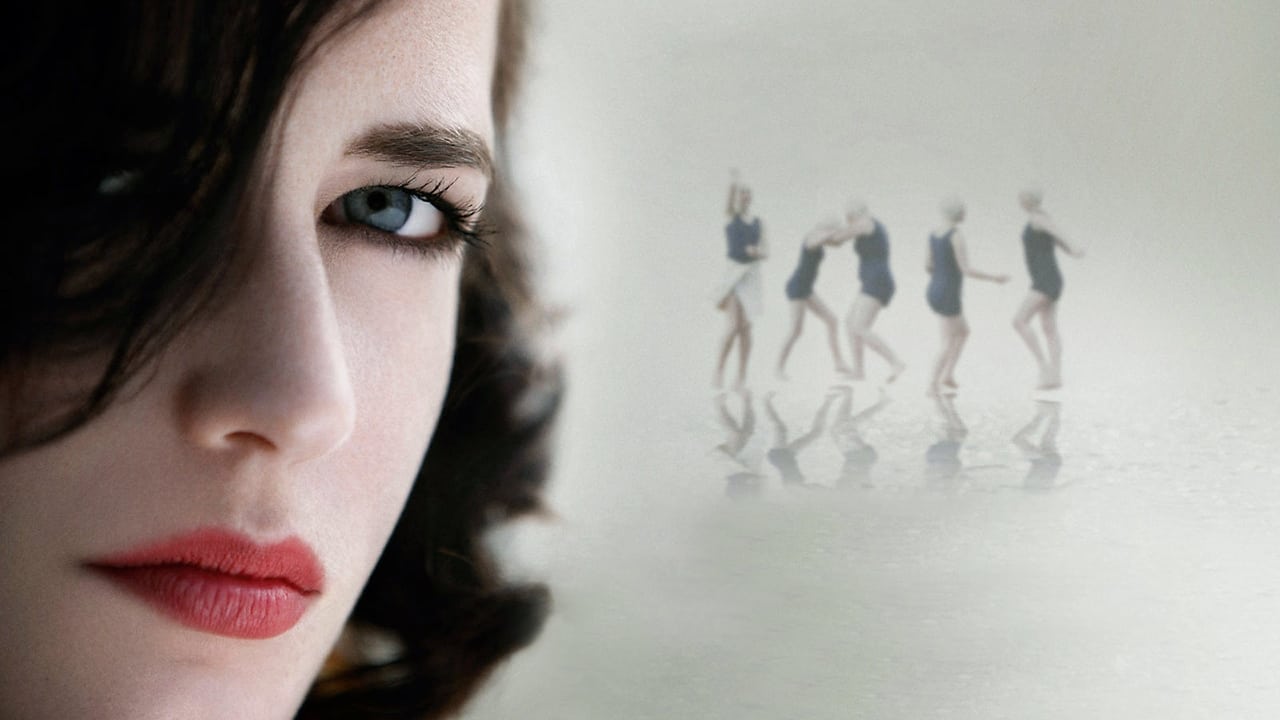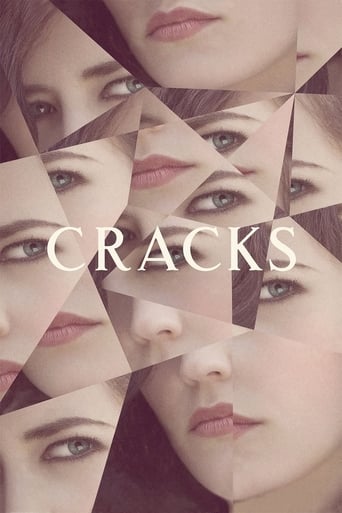

What attracted me to this movie was interesting storyline and Eva Green. And when story got slow and little bit boring, I kept watching it with my eyes wide open because of beautiful cinematography: scenes of nature (especially water), flowers; subliminal messages 'bout transience of time and rather life than death. First class cast did a great job of convincing the audience in credibility of their theatrics, and we all could have empathized with any of a girl in that private school - luckier with Fiamma, less lucky with other, poorer girls, and some of us (I'd say most of us) with a teacher, dreamer with her unfulfilled dreams which she weaves of stories from realistic fairies from all around the world. At the end, you can't decide who are you more sorry of. Luckily, movie provides enough empathy for every watcher. There are cracks in everyone, but only few can find courage in themselves, make metaphorical glue, and wait and see what happens next (with their reasonable desire(s)). Message Miss G thought us was that you should indeed turn your dreams into reality, because if you get stuck in the mold, every day you're procrastinating "getting out", it would be harder.. and you'll end up changing 5 things from your commode. Forever. And remember - chase your desires until they're not hurting someone else.
... View MoreA carefully made, intelligent, powerful film that makes you wonder, among other things, why director Jordan Scott (the daughter of Ridley) has not had the opportunity to make anything else since 2009. It is a film that demands your attention: just when you think you may know where it is heading, it turns the other way. At first, it appears to be the story of a non-conformist teacher inspiring her devoted students; then, it seems to be about the jealously of the teacher's favorite student when she feels she's in danger of being overshadowed by a new arrival; then it looks like the teacher admires the new arrival because she has so much in common with her; and finally, it turns into something else, something darker, leading to a tragedy that has a real impact on the viewer. Exceptional performances, appropriate musical scoring and beautiful photography add to the experience. *** out of 4.
... View MoreEnglish screenwriter, photographer and director Jordan Scott's feature film debut which she co-wrote with screenwriters Caroline IP and Ben Court, is based on a novel from 1999 by South-African author Sheila Kohler. It premiered in the Special Presentations section at the 34th Toronto International Film Festival in 2009, was shot at Pinewood Studios in London, England and on location in Dublin, Ireland and is a UK-Spain-Ireland co-production which was produced by producers Julie Payne, Kwesi Dickson, Christine Vachon, Andrew Lowe and Rosalie Swedlin. It tells the story about a woman named Miss Gribben who teaches a diving team consisting of six girls at a boarding school in Stanley Island, England. The friendship and team-spirit within the team which is fronted by the captain and favourite of Miss Gribben named Di Radfield is good and the students adores their teacher, but then a new student whom is considered for the diving team arrives and early on makes a mark with her challenging behaviour, skills as a diver, experiences and intelligence. Distinctly and subtly directed by British filmmaker Jordan Scott, this quietly paced fictional tale which is narrated from multiple viewpoints, draws a dense and mindful portrayal of an aristocratic Roman Catholic girl from Spain with a breathing condition named Fiamma Coronna who after having been transferred to a new school upsets the sacred dynamic within a closely knit group of girls named Di, Laurel, Lilly, Rosie, Fuzzy and Poppy and becomes the apple of the eye of their revered and matriarchal teacher. While notable for it's naturalistic and atmospheric milieu depictions, sterling cinematography by English cinematographer John Mathieson, production design by production designer Ben Scott, costume design by costume designer Allison Byrne and use of colors and light, this dialog-driven and narrative-driven story about worshiping, obsession, rivalry, education and collectivism where a teacher emphasizes desire and poetry as essential life values for her admiring students whom she has created a utopian universe for and who are as confined as she is, depicts three merging and internal studies of character and contains a timely score by composer Javier Navarrete.This prominently atmospheric, conversational and increasingly intriguing period drama triangle from the late 2000s which is set at a remote religious boarding school for girls called St. Mathilda on an island in England during a summer in the early 1930s and where an unwelcomed newcomer with a secretive background who sees through her free-minded new teacher's romantic fairy-tales becomes her object of desire and rival after she starts shattering her illusions and the power grip she has on the other girls, is impelled and reinforced by it's cogent narrative structure, substantial character development, subtle continuity, cultured and playful characters, abrupt editing, distinct realism, diving scenes, comment by Miss Nieven : "But you must accept that this was an act of God, " and the understated and involving acting performances by French actress Eva Green, Spanish actress Maria Valverde, Irish actress Sinéad Cusack and English actresses Juno Temple and Imogen Potts. A psychological, cinematographic and literary mystery, and a fine directorial debut.
... View MoreThe website, Afterellen.com, fronts 'Cracks' as a "lesbian" film. I'm not exactly sure what constitutes LGBT cinema. But I feel that this one is about bottled up sexual energy, not lesbian love. The girls in the school are institutionally kept ignorant of sex and the perils of the real world. What we witness is nature's victory over man as the sexual audacity of youth overtakes Miss G and Di, with Fiamma as their victim.Miss G is the villain, but not in the conventional sense. I presume she's never had a boyfriend nor a healthy sexual relationship of any kind. So she naively mistakes her infatuation with Fiamma as love, causing her repressed sexuality to leak through the cracks and end up on the wrong person. Fiamma unwillingly finds herself as a combatant against Di over Miss G's attention. At the end of the second act, Di gains the upper hand by removing Fiamma from the school altogether.However, this is a three-way antagonism since the two active role players are Miss G and Di. Miss G makes three failed attempts to earn Fiamma's devotion: by charming her, exercising power over her, and fraternizing with her. Meanwhile, Di is keen to impose the school's social strata against Fiamma, who remains ever so resilient due to her advanced maturity.The third act exercises Fiamma's only remaining option- to befriend Di. But the truce is cut short when Miss G performs her final act of desperation by raping Fiamma. This action was catalyzed by Miss G's last interaction with her; one where she lost some of the team's respect ("Since Fiamma knows what's best, let her take the reigns!").This narrative is a classic example of an established social order turned upside down with the arrival of a newcomer (think 'Mean Girls'), and the school will never be the same for them. Fiamma's death catapults Di to search for a better life outside of the establishment while Miss G finally faces reality.To a lesser extent, this is a parable of man-made structure that attempts to sculpt human behavior by building walls around children and repressing their natural curiosity. This indoctrination usually works, but has its casualties. The ending reveals that Miss G is one such casualty.
... View More